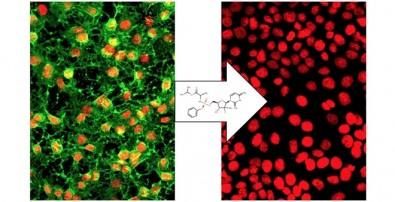The medication is already used to treat hepatitis C and has passed all human use approval tests, so it can be fairly easily deployed if the chikungunya epidemic forecast for the next two years materializes.

Credit: Bonotto et al.
A study performed at the University of São Paulo’s Biomedical Science Institute (ICB-USP) in Brazil shows that sofosbuvir, a drug used to treat chronic hepatitis C, is capable of eliminating chikungunya virus and yellow fever virus.
“Human cells infected by chikungunya virus were treated with sofosbuvir, and the drug eliminated the virus without damaging any cells. The drug proved to be 11 times more effective against the virus than against cells,” said Rafaela Milan Bonotto, a coauthor of the study.
The study relating to chikungunya was conducted as part of Bonotto’s PhD research with a scholarship from São Paulo Research Foundation – FAPESP and supervision by Professor Lucio Freitas-Junior.
An article on the study, signed by Bonotto, Freitas-Junior and collaborators, can be found on the open platform F1000 Research. An article on the group’s research relating to yellow fever will be published shortly.
The discovery is highly significant for public health, as a chikungunya epidemic has been forecast for the coming two years in Brazil.
“Drug development is extremely costly and time-consuming. The process takes 12 years on average between the start of research and bringing the drug to market. The cost is on the order of US$1.5 billion or more,” Freitas-Junior said. “Sofosbuvir has been fully approved for human use. This means it can be readied for use against chikungunya in one to three years, for a much lower cost, estimated at approximately US$500,000.
“He noted that chikungunya is a severe disease not only owing to the acute episode itself – causing symptoms similar to those of dengue – but because it can cause complications that include highly debilitating joint pain lasting months or years. The patient may become incapacitated, unable to work and even bedridden.
“So far we have no vaccine, and our diagnostic tools need to be optimized,” he continued. “Sofosbuvir is something concrete that could become a powerful weapon against this virus. The results of our research could enable any interested institutions to begin clinical trials.”
Bonotto said, “We don’t yet know exactly how the drug works in molecular terms. What we discovered was the macroscopic result: elimination of the virus and preservation of cells. The drug has proven effective in treating hepatitis C because it inhibits the protein that synthesizes the viral genome. The same may happen in the case of chikungunya, but the action mechanism must be elucidated.”
The study supported by FAPESP was conducted on the Phenotypic Screening Platform (PSP), a new initiative of ICB-USP’s Microbiology Department. Phenotypic screening assays have been successfully used to discover drugs with new action mechanisms.
The PSP has a portfolio of over 15 different types of phenotypic screening assays performed in accordance with the standards accepted by the pharmaceutical industry. The assays have been used as part of a strategy to reposition drugs for infectious diseases.
Four other researchers took part in the study in addition to Bonotto and Freitas-Junior: Glaucia Souza-Almeida, Soraya Jabur Badra, Luiz Tadeu Figueiredo and Carolina Borsoi Moraes.
###
About São Paulo Research Foundation (FAPESP)
The São Paulo Research Foundation (FAPESP) is a public institution with the mission of supporting scientific research in all fields of knowledge by awarding scholarships, fellowships, and grants to investigators linked with higher education and research institutions in the State of São Paulo, Brazil. FAPESP is aware that the very best research can only be done by working with the best researchers internationally. Therefore, it has established partnerships with funding agencies, higher education, private companies, and research organizations in other countries known for the quality of their research and has been encouraging scientists funded by its grants to further develop their international collaboration. For more information: http://www.
Media Contact
Joao Carlos Silva
[email protected]
55-113-838-4381
Original Source
http://agencia.
Related Journal Article
http://dx.




